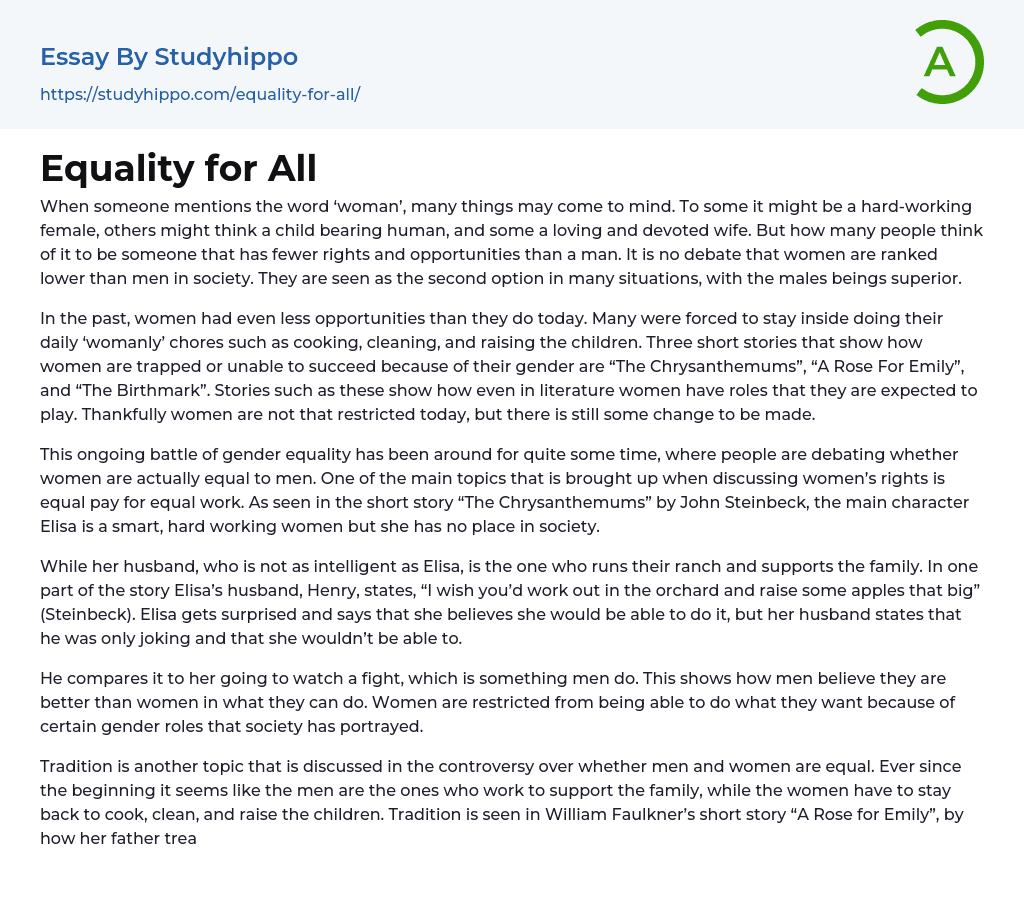When the word 'woman' is mentioned, it can evoke various thoughts and associations.
Different people have different perspectives on the concept of womanhood. Some perceive women as diligent individuals, while others see them mainly as mothers or affectionate spouses. However, it is essential to acknowledge that there are still individuals who hold the opinion that women should have lesser rights and prospects than men. It is undeniable that women frequently encounter lower social standing, being regarded as secondary choices in numerous scenarios compared to their male counterparts who are deemed superior. It should be emphasized that in the past, women had even fewer opportunities than they currently possess.
In the past, women were often confined to their homes, occupied with their traditional duties including cooking, cleaning, and raising children. Three brief narratives, namely "The Chrysanthemums," "A Rose Fo
...r Emily," and "The Birthmark," demonstrate how gender limits or obstructs women from achieving success. These stories emphasize the societal expectations imposed on women that are prevalent even in literature. Fortunately, modern times have alleviated some of these constraints on women, although further progress is required.
The ongoing battle for gender equality has persisted for quite some time, with debates surrounding the equality of women compared to men. One crucial topic frequently discussed in relation to women's rights is equal pay for equal work. In John Steinbeck's short story "The Chrysanthemums," Elisa, a diligent and intelligent woman, unfortunately does not hold a significant place in society. Despite Elisa's capabilities, it is her husband Henry who operates their ranch and provides for their family, despite being less intellectually inclined than Elisa. A specific scene in the story captures this sentimen
when Henry expresses his desire for Elisa to cultivate large-sized apples in their orchard (Steinbeck).
Elisa is surprised but believes she could do it, however, her husband jokes that she wouldn't be able to. He compares it to women going to watch a fight, implying men are better. This reflects societal gender roles restraining women from pursuing their desires.
The topic of gender equality encompasses the consideration of tradition. Throughout history, it has been customary for men to take on the role of providing for the family, while women are expected to focus on household tasks like cooking, cleaning, and raising children. In "A Rose for Emily" by William Faulkner, tradition is apparent in how Emily is treated by her father and judged by the townspeople for not conforming to conventional gender roles. A line from the story states, "None of the young men were quite good enough for Miss Emily and such" (Faulkner). This quote underscores Emily's father's controlling nature and his disregard for her own desires.
Mr. Grierson desires to maintain his family's legacy and, to achieve this, he secludes his daughter and assumes responsibility for her choices. Emily had limited knowledge of anyone other than her father due to his manipulation, so when he died, she struggled to accept his passing. Emily deviates from the typical women in the town once she becomes unable to afford her taxes.
The townspeople view Emily as a burden because she deviates from the conventional role expected of women in society. The women in this narrative are depicted as nosy and unsympathetic towards Emily, likely due to her defiance of societal norms. In contemporary society, women are typically the ones
striving for perfection, but in Nathaniel Hawthorne's "The Birthmark," it is the man who seeks to perfect his wife. Aylmer, the scientist, contends that his wife Georgiana would be flawless if she were to remove her birthmark. Notably, he fails to acknowledge her inner beauty while solely focusing on her external appearance.
Despite Georgiana valuing her birthmark and considering it a precious gem, Aylmer's hatred for it caused her to dislike it as well. Due to her love for Aylmer, Georgiana appears to be governed by him, leading to her untimely demise. Conversely, Aylmer was so disturbed by his wife's birthmark that he was willing to jeopardize her life just to rid her of it.
In order to console Georgiana, Aylmer assures her, "Do not be afraid, my dearest! Do not shy away from me! Trust me, Georgiana, I even find joy in this one flaw of yours because it will bring such ecstasy when we remove it" (Hawthorne). This demonstrates Aylmer's effort to alleviate Georgiana's fears, although she had valid reasons for feeling scared. It appears that Georgiana surrenders to Aylmer's authority and dutifully follows his instructions, even if she disagrees with them. The issue of gender equality remains controversial as women continue to face disparities in wages, status, and influence despite progress made in areas like career opportunities.
There exists a discrepancy in the ranking of women in the workforce. One viewpoint suggests that this is due to women exerting lesser effort than men, while another perspective holds that they are deprived of equal opportunities to demonstrate their capabilities. Women engage in dialogue with the goal of increasing awareness about ongoing societal inequalities.
Regardless of gender, it
is crucial to stand together in order to create a future society that values gender equality and enables both men and women to thrive. Women possess distinct characteristics and face diverse circumstances within society, leading to positive or negative consequences. Currently, numerous women defy societal norms as depicted in the literary works of Steinbeck, Faulkner, and Hawthorne.
While many women still primarily focus on domestic responsibilities and caring for their families, there is also a noteworthy group of employed women who hold esteemed positions in their careers. It is entirely acceptable for women to challenge societal expectations and forge their own paths.




